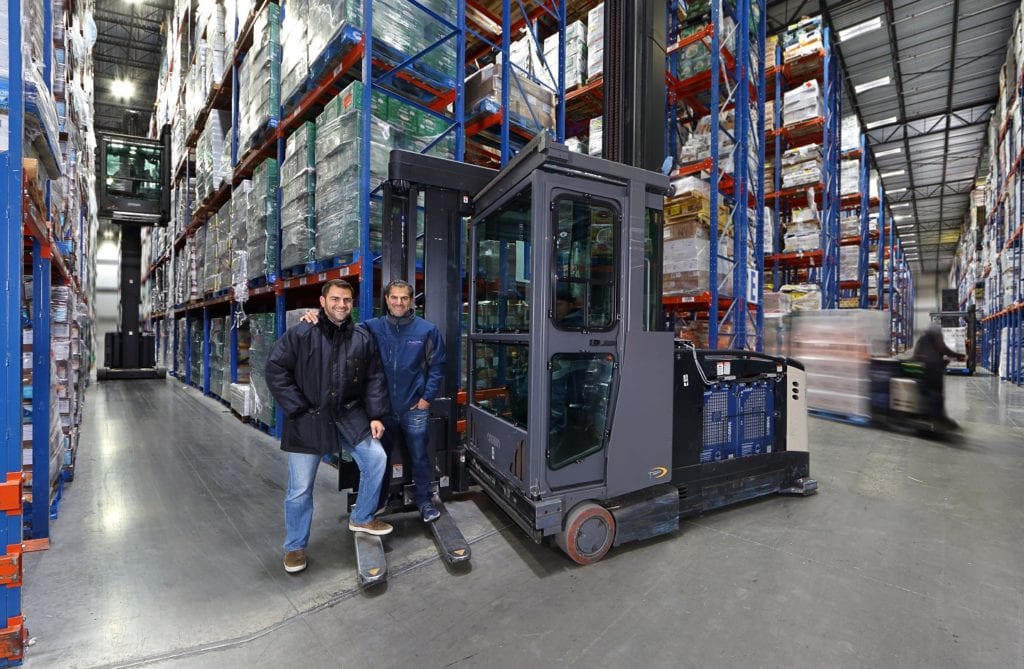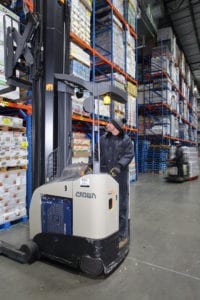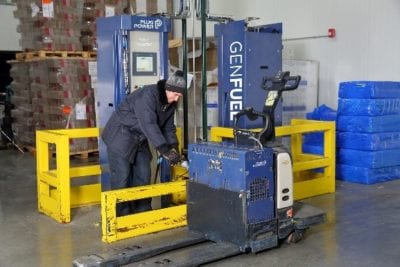Expanding on the Business Case for Cold Storage: a followup to our webinar Q&A
Recently, Plug Power and FreezPak Logistics, a leading full-service cold and dry storage facility,  participated in a Northeast Electrical Energy Storage Cluster (NEESC) webcast discussing the success of fuel cell power solutions for material handling and other warehouse lift equipment, with an emphasis on the extended benefits for cold storage facilities. The webcast resulted in a very informative Q&A session – with impressive workplace use-metrics given by David Saoud, co-owner of FreezPak.
participated in a Northeast Electrical Energy Storage Cluster (NEESC) webcast discussing the success of fuel cell power solutions for material handling and other warehouse lift equipment, with an emphasis on the extended benefits for cold storage facilities. The webcast resulted in a very informative Q&A session – with impressive workplace use-metrics given by David Saoud, co-owner of FreezPak.
Plug Power would like to highlight a few of the questions and expand a bit further on each of the topics.
Question 1: As far as the business decision to use fuel cells, what types of things did you take a close look at when you did your financial evaluation?
 David’s reply: When Plug Power approached us, I knew nothing about fuel cells. You really need to see it in operation to understand what it does. When I toured another customer’s facility, I immediately understood how this would help us. Number one was space. To have a 5,000 square foot battery room is a waste of space; it’s not generating revenue whatsoever. We make money storing stuff and picking product. Second was the productivity. Plug Power could measure the productivity by doing a study of our operations. When I saw it on paper using our numbers, I understood the return on investment. And then safety – batteries are big and heavy and difficult to move. I would never go back to lead acid batteries. It’s not even a question.
David’s reply: When Plug Power approached us, I knew nothing about fuel cells. You really need to see it in operation to understand what it does. When I toured another customer’s facility, I immediately understood how this would help us. Number one was space. To have a 5,000 square foot battery room is a waste of space; it’s not generating revenue whatsoever. We make money storing stuff and picking product. Second was the productivity. Plug Power could measure the productivity by doing a study of our operations. When I saw it on paper using our numbers, I understood the return on investment. And then safety – batteries are big and heavy and difficult to move. I would never go back to lead acid batteries. It’s not even a question.
Plug Power’s additional comments: David did a great job accentuating key components of Plug Power’s primary value proposition – productivity, efficiency and sustainability. Another metric that frequently comes into play when making a business use case is the enhancements made by the predictability of fuel cells. Predictability impacts both productivity and efficiency, but even on its own, drives revenue. A predictable lift truck fleet allows DC managers to optimize their assets and maximize fleet utilization.
Question 2: It takes a great amount of courage to be the first to do anything. You were an early adopter of a technology that, although you could see on paper that it made sense, actually pulling the trigger to move forward is a decision that many companies don’t have the courage to make. What would you say to those companies who can understand intellectually that fuel cells would benefit them, but aren’t willing or courageous enough to take that next step?
David’s reply: It did take a lot of time and thought. My brother and I are into technology, and we really saw that this was a big thing, we saw the productivity and we thought this was the future. And it is the future. Batteries are in the past. This is going to drive the warehousing industry and I smiled with my brother when we saw that Amazon saw the same thing we did.
 Plug Power’s additional comments: Plug Power has built a market where one did not previously exist. And with 122 million operating hours and 6 million hydrogen fuelings, the validity of the market is undeniable.
Plug Power’s additional comments: Plug Power has built a market where one did not previously exist. And with 122 million operating hours and 6 million hydrogen fuelings, the validity of the market is undeniable.
Question 3: What is the actual uptime of the fuel cells at FreezPak?
David’s reply: Plug has a lot of data. Every time we fuel the forklifts, they’re collecting data back into their headquarters. We’re able to see real time what our fleet is doing. They guarantee 97%. Currently, we’re doing 98.4% uptime, which is phenomenal. Downtime is big for us, especially during our peak seasons.
Plug Power’s additional comments: At the base of Plug Power’s business is our ability to offer customers a power solution that will keep their fleets running longer, faster and at higher efficiency. We excel at this – and to David’s point – are able to ensure these metrics are hit real-time with our SiteView intelligent data product. SiteView is a component of Plug Power’s GenCare aftermarket service product – an intelligent IoT data suite that enables us to provide unparalleled “best in class” uptime to professionals who use Plug Power’s GenDrive fuel cells to power their material handling equipment. The level of information available to customers is transformational – everything is tracked, from the upcoming maintenance schedule, to daily hydrogen fuel dispensing. SiteView allows us to be proactive with maintenance while guaranteeing a minimum of 97% uptime at each location. This enables material handling professionals to do what they do best: keep those products moving across the supply chain.
SiteView collects operational data, and then the information is delivered to our intelligent “rule-based” data compilation software, dissected and served back to our GenCare technicians in reports they can use. The data helps these technicians to know when to optimally time maintenance activities to ensure that the material handling equipment is in service for as long as possible, which helps our customers be as productive as possible. If the data indicates an emerging issue, technicians can schedule maintenance so that unplanned work stoppages do not occur.
This blog only scratches the surface of the detail given in the webcast. You can listen to the full production here – and learn even more about why hydrogen fuel cells beat any other power solutions for lift truck fleets operating in cold storage environments.
The post Expanding on the Business Case for Cold Storage: a followup to our webinar Q&A appeared first on Plug Power.
